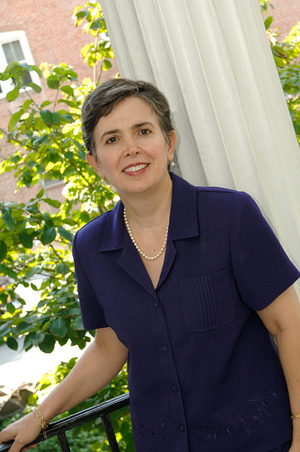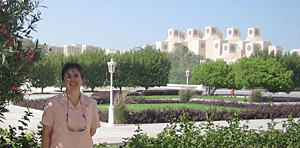- Rozovsky wins prestigious NSF Early Career Award
- UD students meet alumni, experience 'closing bell' at NYSE
- Newark Police seek assistance in identifying suspects in robbery
- Rivlin says bipartisan budget action, stronger budget rules key to reversing debt
- Stink bugs shouldn't pose problem until late summer
- Gao to honor Placido Domingo in Washington performance
- Adopt-A-Highway project keeps Lewes road clean
- WVUD's Radiothon fundraiser runs April 1-10
- W.D. Snodgrass Symposium to honor Pulitzer winner
- New guide helps cancer patients manage symptoms
- UD in the News, March 25, 2011
- For the Record, March 25, 2011
- Public opinion expert discusses world views of U.S. in Global Agenda series
- Congressional delegation, dean laud Center for Community Research and Service program
- Center for Political Communication sets symposium on politics, entertainment
- Students work to raise funds, awareness of domestic violence
- Equestrian team wins regional championship in Western riding
- Markell, Harker stress importance of agriculture to Delaware's economy
- Carol A. Ammon MBA Case Competition winners announced
- Prof presents blood-clotting studies at Gordon Research Conference
- Sexual Assault Awareness Month events, programs announced
- Stay connected with Sea Grant, CEOE e-newsletter
- A message to UD regarding the tragedy in Japan
- More News >>
- March 31-May 14: REP stages Neil Simon's 'The Good Doctor'
- April 2: Newark plans annual 'wine and dine'
- April 5: Expert perspective on U.S. health care
- April 5: Comedian Ace Guillen to visit Scrounge
- April 6, May 4: School of Nursing sponsors research lecture series
- April 6-May 4: Confucius Institute presents Chinese Film Series on Wednesdays
- April 6: IPCC's Pachauri to discuss sustainable development in DENIN Dialogue Series
- April 7: 'WVUDstock' radiothon concert announced
- April 8: English Language Institute presents 'Arts in Translation'
- April 9: Green and Healthy Living Expo planned at The Bob
- April 9: Center for Political Communication to host Onion editor
- April 10: Alumni Easter Egg-stravaganza planned
- April 11: CDS session to focus on visual assistive technologies
- April 12: T.J. Stiles to speak at UDLA annual dinner
- April 15, 16: Annual UD push lawnmower tune-up scheduled
- April 15, 16: Master Players series presents iMusic 4, China Magpie
- April 15, 16: Delaware Symphony, UD chorus to perform Mahler work
- April 18: Former NFL Coach Bill Cowher featured in UD Speaks
- April 21-24: Sesame Street Live brings Elmo and friends to The Bob
- April 30: Save the date for Ag Day 2011 at UD
- April 30: Symposium to consider 'Frontiers at the Chemistry-Biology Interface'
- April 30-May 1: Relay for Life set at Delaware Field House
- May 4: Delaware Membrane Protein Symposium announced
- May 5: Northwestern University's Leon Keer to deliver Kerr lecture
- May 7: Women's volleyball team to host second annual Spring Fling
- Through May 3: SPPA announces speakers for 10th annual lecture series
- Through May 4: Global Agenda sees U.S. through others' eyes; World Bank president to speak
- Through May 4: 'Research on Race, Ethnicity, Culture' topic of series
- Through May 9: Black American Studies announces lecture series
- Through May 11: 'Challenges in Jewish Culture' lecture series announced
- Through May 11: Area Studies research featured in speaker series
- Through June 5: 'Andy Warhol: Behind the Camera' on view in Old College Gallery
- Through July 15: 'Bodyscapes' on view at Mechanical Hall Gallery
- More What's Happening >>
- UD calendar >>
- Middle States evaluation team on campus April 5
- Phipps named HR Liaison of the Quarter
- Senior wins iPad for participating in assessment study
- April 19: Procurement Services schedules information sessions
- UD Bookstore announces spring break hours
- HealthyU Wellness Program encourages employees to 'Step into Spring'
- April 8-29: Faculty roundtable series considers student engagement
- GRE is changing; learn more at April 15 info session
- April 30: UD Evening with Blue Rocks set for employees
- Morris Library to be open 24/7 during final exams
- More Campus FYI >>
3:36 p.m., Sept. 24, 2008----When Zoubeida Dagher, UD professor of education, was asked to serve as deputy dean in the College of Education at Qatar University, it was a challenge she says she couldn't refuse.
“I felt I could make a contribution to the college in helping with professional development, research and accreditation,” Dagher, whose field is science education, said. She has many ties with the American University of Beirut, which suggested her for the position.
“The timing was right, as well. My two children are young and could adjust well, and my husband could take his work with him. We were provided with a nice house, found a good school for the children, and I even had a driver who took me to work everyday,” Dagher said.
Qatar is a wealthy country about twice the size of Delaware and borders Saudi Arabia, Dagher said. It is governed by an emir, Sheikh Hammad bin Khalifa Al-Thani, who is interested in promoting scientific research and initiatives in other fields. Approximately 80 percent of the population is guest workers from professionals to day laborers. The religion is Islam, with the women wearing traditional black headscarves and abaya (long black cloaks) and the men wearing white ghotra (head-covers) and thobe (long dresses).
The public schools in Qatar are separated by sex, and Qatar University has male and female campuses. At the college level, however, women and men faculty teach male and female students. Women have succeeded in the field of education--the dean of the college is a woman and so is the president, Dagher said.
“A lot has been happening in Qatar in the past few years,” Dagher said. “National curriculum standards were put into place, English replaced Arabic as the language of instruction in science and mathematics in schools, and schools were given more individual freedom so there have been many changes and challenges for teachers.
“All in all, it was a rewarding year working with the dean and faculty teams to accomplish a great deal,” Dagher said. “We installed a mentoring plan between college faculty and school teachers, held workshops for professional development and encouraged collaborative research and applying for competitive grants. In general, we helped raise the morale of faculty and teachers and helped establish the college as a leader in education.”
Dagher was a keynote speaker at the first action research conference, participated in a higher education conference and attended the first Conference of Arab Expatriate Scientists, which charted plans for supporting scientific research in biomedical, environmental and information technology. The emir has dedicated 2.8 percent of Qatar's Gross Domestic Product to scientific research and related fields, Dagher said.
Qatar University is the only public university in the country, but other universities have a presence there, such as Cornell Medical School, Northwestern and Carnegie Mellon, Dagher said.
Dagher said that she feels there many opportunities for UD in Qatar and the Persian Gulf region in terms of study abroad programs, collaborative research projects, faculty and student exchange programs and providing technical expertise that fit in with UD's Global Initiative.
Dagher is a graduate of Beirut University College, has her master's degree from the American University of Beirut and her doctorate from the University of Iowa. Since joining the UD faculty in 1989, she has served as a visiting professor at Lebanese University, visiting scholar at Curtin University of Technology in Perth, Australia, and has received a National Academy of Education Spencer Postdoctoral Fellowship.
Article by Sue Moncure




